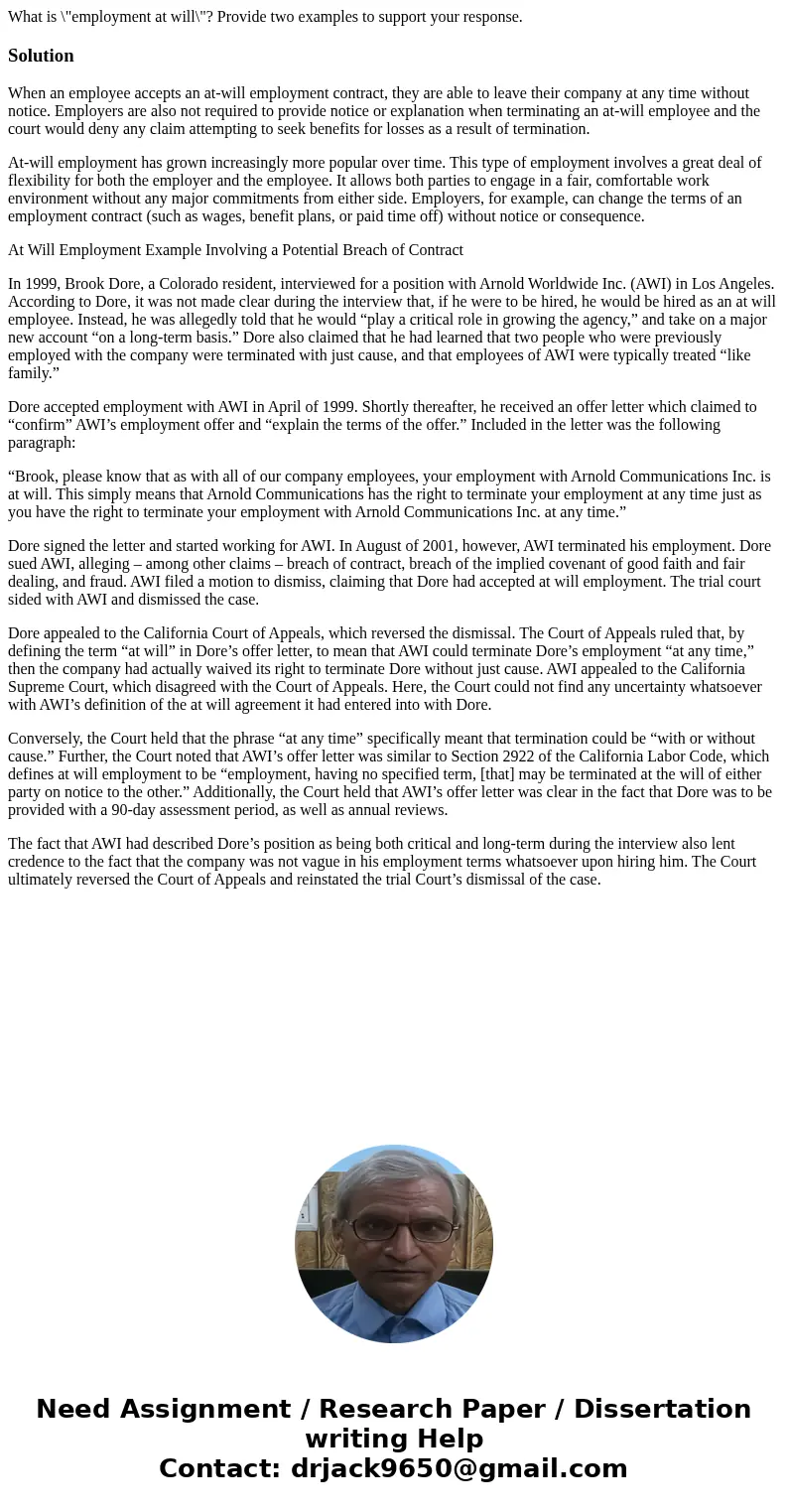What is employment at will Provide two examples to support y
What is \"employment at will\"? Provide two examples to support your response.
Solution
When an employee accepts an at-will employment contract, they are able to leave their company at any time without notice. Employers are also not required to provide notice or explanation when terminating an at-will employee and the court would deny any claim attempting to seek benefits for losses as a result of termination.
At-will employment has grown increasingly more popular over time. This type of employment involves a great deal of flexibility for both the employer and the employee. It allows both parties to engage in a fair, comfortable work environment without any major commitments from either side. Employers, for example, can change the terms of an employment contract (such as wages, benefit plans, or paid time off) without notice or consequence.
At Will Employment Example Involving a Potential Breach of Contract
In 1999, Brook Dore, a Colorado resident, interviewed for a position with Arnold Worldwide Inc. (AWI) in Los Angeles. According to Dore, it was not made clear during the interview that, if he were to be hired, he would be hired as an at will employee. Instead, he was allegedly told that he would “play a critical role in growing the agency,” and take on a major new account “on a long-term basis.” Dore also claimed that he had learned that two people who were previously employed with the company were terminated with just cause, and that employees of AWI were typically treated “like family.”
Dore accepted employment with AWI in April of 1999. Shortly thereafter, he received an offer letter which claimed to “confirm” AWI’s employment offer and “explain the terms of the offer.” Included in the letter was the following paragraph:
“Brook, please know that as with all of our company employees, your employment with Arnold Communications Inc. is at will. This simply means that Arnold Communications has the right to terminate your employment at any time just as you have the right to terminate your employment with Arnold Communications Inc. at any time.”
Dore signed the letter and started working for AWI. In August of 2001, however, AWI terminated his employment. Dore sued AWI, alleging – among other claims – breach of contract, breach of the implied covenant of good faith and fair dealing, and fraud. AWI filed a motion to dismiss, claiming that Dore had accepted at will employment. The trial court sided with AWI and dismissed the case.
Dore appealed to the California Court of Appeals, which reversed the dismissal. The Court of Appeals ruled that, by defining the term “at will” in Dore’s offer letter, to mean that AWI could terminate Dore’s employment “at any time,” then the company had actually waived its right to terminate Dore without just cause. AWI appealed to the California Supreme Court, which disagreed with the Court of Appeals. Here, the Court could not find any uncertainty whatsoever with AWI’s definition of the at will agreement it had entered into with Dore.
Conversely, the Court held that the phrase “at any time” specifically meant that termination could be “with or without cause.” Further, the Court noted that AWI’s offer letter was similar to Section 2922 of the California Labor Code, which defines at will employment to be “employment, having no specified term, [that] may be terminated at the will of either party on notice to the other.” Additionally, the Court held that AWI’s offer letter was clear in the fact that Dore was to be provided with a 90-day assessment period, as well as annual reviews.
The fact that AWI had described Dore’s position as being both critical and long-term during the interview also lent credence to the fact that the company was not vague in his employment terms whatsoever upon hiring him. The Court ultimately reversed the Court of Appeals and reinstated the trial Court’s dismissal of the case.

 Homework Sourse
Homework Sourse